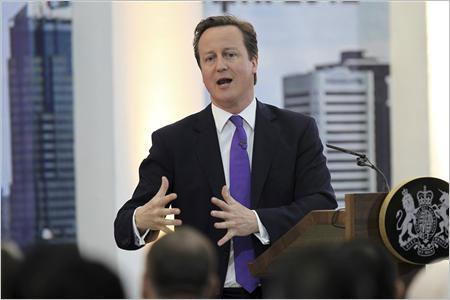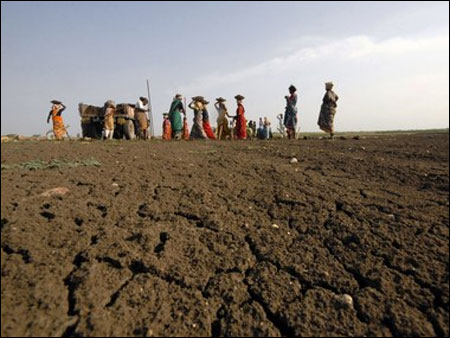 | « Back to article | Print this article |
Mirage of local empowerment
Poverty, unemployment and inequality are not problems that communities can solve on their own.
The British Prime Minister has recently said that his government wants to make society stronger by getting more people working together to run their own affairs locally.
In pursuit of this objective the government has promised to put more power and responsibility into the hands of families, locally-based communities, co-operatives, charities, social enterprises and small businesses.
Serious decentralisation that empowers people at the local level has been called for by a wide variety of activists across the world for decades.
In the UK the New Economics Foundation (NEF), a leading London based think-tank, has lobbied for these measures and done pioneering research to show how the local economy and social institutions are suffering.
But now, interestingly, the NEF has welcomed the British government's move with a note of caution. There are some interesting parallels with their response and struggles for greater local power in India.
Click on NEXT for more...
Mirage of local empowerment
In a report titled 'Ten Big Questions about the Big Society' the NEF reiterates the premise on which it has worked for the last three decades.
- When people are given the chance and treated as if they are capable, they tend to find they know what is best for them, and can work out how to fix any problems they have and realize their dreams.
- Bringing local knowledge based on everyday experience to bear on planning and decision-making usually leads to better results.
- Evidence shows that, when people feel they have control over what happens to them and can take action on their own behalf, their physical and mental well-being improves.
- When individuals and groups get together in their neighborhoods, get to know each other, work together and help each other, there are usually lasting benefits for everyone involved: networks and groups grow stronger, so that people who belong to them tend to feel less isolated, more secure, more powerful and happier.
Click on NEXT for more...
Mirage of local empowerment
In the context of the prolonged recession, and a huge deficit, the British government seems to be hoping that if people take more responsibility and do more to help themselves and their neighbors this might put less pressure on state funded public services.
But NEF is disappointed that the government is not addressing the fundamental problem - namely that modern capitalism leads to accumulations of wealth and power in the hands of a few at the expense of others. Plus, the current structure of the UK economy selectively restricts the ability of citizens to participate.
As the NEF's report says: "The Prime Minister says the 'Big Society' is about enabling and encouraging people to come together to solve their problems‟, but there is nothing in the government's plans to encourage the inclusion of outsiders, to break down barriers created by wealth and privilege, to promote collaboration rather than competition between local organizations, or to prevent those that are already better off and more dominant from flourishing at the expense of others."
Even more significantly, says the NEF's critique, 'empowerment' is not a substitute for an equal chance in life so that, regardless of background or circumstance, everyone can grow and prosper.
Click on NEXT for more...
Mirage of local empowerment
As in India, the UK experience also shows that poverty, unemployment and inequality are not problems that communities can solve on their own. So decentralization of power is meaningful only to the extent that people have more power to influence the way markets work and tilt them towards social justice.
For example, says the NEF: 'the banking system should be overhauled to give everyone, but especially those on lower incomes, ready access to credit and finance.'
The same trend is reflected in India - where the goal of 'inclusive growth' assumes that the pattern and direction of growth is as it should be.
Increase in Gross Domestic Product (GDP) along with a string of landmark legislations - such as NREGA, Forest Rights Act, Right to Education, and the upcoming Food Security Act - are expected to facilitate 'inclusion'.
Reality, in practice, is of course quite different. Each of these legislations is indeed having positive effects. But the losses suffered by local communities, particularly those displaced by mining and other development projects neutralise such gains.
So on the one hand there are networks like People's Alliance of People's Movements which connect activist groups engaged in pitched battles for control over natural resources, habitats and livelihoods.
The most famous example of this being the struggle of adivasi communities against Vedanta and Posco in Orissa.
Click on NEXT for more...
Mirage of local empowerment
Then there are efforts to bring NGOs and government departments together maximize the vast amount of resources allocated through many government resources and better delivery of public services.
In February, the Ministry of Rural Development and the Planning Commission, jointly released a concept note for a proposed Bharat Rural Livelihoods Foundation which aim to facilitate better coordination between government departments, local communities and NGOs.
The objectives are undoubtedly laudable -- sustainable livelihoods with dignity; enhanced access to and control over resources; responsive and accountable institutions of self-governance; increased access and influence over product and service markets; enhanced mobility and access to information and so on.
All of this is necessary but it is not sufficient. Will local communities have final say in the projects that are located in their area? Or will they be condemned and harassed by the police - as is happening to citizens opposing nuclear power plants at different locations in India.
As the NEF report says, and this will be true for many parts of the world, unless structural anomalies and injustices are altered local empowerment may turnout to be a mirage.




